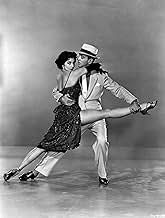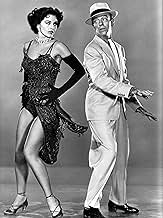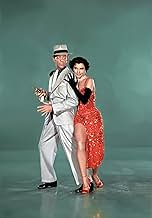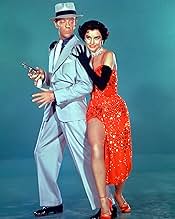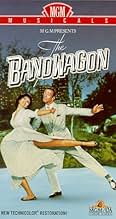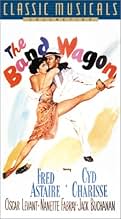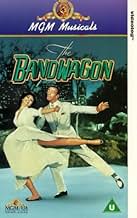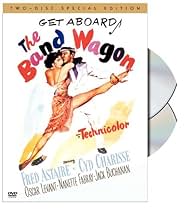Tony Hunter é uma estrela de musicais que entrou em decadência, mas na esperança de que um show da Broadway reavivará sua carreira, ele aceita trabalhar com um diretor cujas pretensões artís... Ler tudoTony Hunter é uma estrela de musicais que entrou em decadência, mas na esperança de que um show da Broadway reavivará sua carreira, ele aceita trabalhar com um diretor cujas pretensões artísticas ameaçam o sucesso de seu retorno.Tony Hunter é uma estrela de musicais que entrou em decadência, mas na esperança de que um show da Broadway reavivará sua carreira, ele aceita trabalhar com um diretor cujas pretensões artísticas ameaçam o sucesso de seu retorno.
- Direção
- Roteiristas
- Artistas
- Indicado a 3 Oscars
- 2 vitórias e 5 indicações no total
- Gabrielle Gerard
- (canto)
- (não creditado)
- Hot Dog Vendor
- (não creditado)
- Stagehand
- (não creditado)
- Train Porter
- (não creditado)
- Dancer
- (não creditado)
- Dancer
- (não creditado)
- Dancer in Troupe
- (não creditado)
- Theatre Patron
- (não creditado)
- Auction Guest
- (não creditado)
- Dancer in Troupe
- (não creditado)
- Producer
- (não creditado)
Avaliações em destaque
It's probably hard to avoid comparing this film to SINGIN' IN THE RAIN, since they were made just a year apart and were both written by Betty Comden and Adolph Green. Moreover, the themes are even vaguely similar--THE BAND WAGON is a gentle, sharp satire on theatrical goings-on; SINGIN' IN THE RAIN a wicked parody of Hollywood and movie-making. Both films list Cyd Charisse as one of the characters; both films have a ballet section towards the end of the film. And of course, both films star (separately, unfortunately) the two greatest dancing talents of any and every Hollywood generation--Fred Astaire (TBW) and Gene Kelly (SITR). So certainly, comparisons are rife... the films seem to *beg* one to make them! Personally, the chips fall on the side of SITR for me: it's got a tighter story line, it's less talky, the chemistry between the leads is impeccable, and the songs and dances are simply wonderful.
That is, however, an entirely personal preference. There are people--there are in fact several other IMDB reviewers--who prefer THE BAND WAGON, and with good reason. Entirely on its own merits and not in comparison to SITR (as it should be judged), this film is exactly what it sets out to be: a cracking two hours worth of sheer entertainment. It's cleverly written, while the songs and dances are charming and some even mind-blowing. Vincente Minelli does an excellent job of directing; he is, after all, justly known as the master of musical films. Astaire couldn't be bad if he tried, and he's quite ably supported by his cast of Charisse, Levant, Fabray and Buchanan. The numbers range from the heartbreakingly romantic and simple (Charisse and Astaire falling in love to 'Dancing In The Dark'); through to the clever and amusing (most of the brief numbers attributed to 'The Band Wagon', the play within the movie, but most especially the 'Triplets' number with Astaire, Fabray and Buchanan); on to the rousing and hilarious (Astaire's German accent midway through 'I Love Louisa); and finally to those that are simply stunning in their sheer technical mastery (without a doubt the 'Girl Hunt' ballet). And of course, that's forgetting to mention the song that best sums up the entire spirit of THE BAND WAGON: 'That's Entertainment!'. Joyously performed by Astaire, Fabray, Buchanan and Levant (and in a finale reprisal also featuring Charisse), you really get the feeling that *this* is what Hollywood, and more specifically, the MGM musical, is about. And at the game of entertainment, THE BAND WAGON succeeds handsomely.
I think the only problem I have with THE BAND WAGON is that it just doesn't come together as perfectly and as seamlessly as I'd like. There are moments when my attention drifts, and the acting is frequently uneven. (An exception would be Fabray, who simply radiates exuberance with her big voice and great moves in relatively little screen time.) I've said that Astaire couldn't be bad if he tried. True, he *isn't* bad... just a little listless, it seems to me, particularly in the first half of the film. His dancing, however, is faultless as usual, just as you'd expect from Astaire. And he definitely seems to warm up considerably in the second half of the film. It's rather a shame that there's a spark missing from Charisse's performance as well--as a dancer she is visually *and* emotionally arresting, but she's quite frankly not as much an actress as she is a dancer. (She had the same problem in BRIGADOON, and she didn't have to act in SINGIN' IN THE RAIN except through her dancing.) Most of the time her performance is passable, reaching 'good' and occasionally 'great' at the most naturalistic parts--for example, when she's laughing or pretending to smoke with Tony. Astaire and Charisse are fantastic in their two main numbers together though--'Dancing In The Dark' is one of the best, simplest and most romantic film dances I've ever seen, and 'Girl Hunt' is so inventive and perfectly executed that you can't help thinking these two dancers really *do* match somehow.
Simply put, you just couldn't go wrong with THE BAND WAGON. You'll laugh, you'll marvel, you'll sing along... but most of all, you'll be well-entertained. And if *that's* the point the film is trying to make... point surely very well-taken! 8/10
There are, of course, other highlights - Oscar Levant and Nanette Fabray's acidic writers; Jack Buchanan's overblown producer; Fred's dance with the shoeshine boy, Le Roy Daniels; anything featuring Cyd Charisse - and those wonderful musical numbers, ranging from the anthem 'That's Entertainment' to the hilarious 'Triplets'.
'The Band Wagon' sends up the old film staple plot "putting on a show" and does it brilliantly, thanks to the crackling Comden/Green script. One of MGM's best musical efforts, hugely enjoyable.
Você sabia?
- CuriosidadesIn the DVD bonus features, Nanette Fabray stated that Oscar Levant was difficult to work with. Whenever something would go wrong or he would make a mistake, he would blame whoever was around. This included stage hands, other actors, lighting technicians, or whoever was handy. She said that, since she was usually closest, she caught the brunt of it. Following a botched take, he again blamed her for something. She lost her temper and told him off using unladylike language. Everyone on the set applauded. After that, he was much easier to work with.
- Erros de gravaçãoAt the New York opening night, the theater name on the marquee is Alcott Theatre, but the program cover has Stratton Theatre.
- Citações
Gabrielle Gerard: Oh, that's a very early Degas, isn't it?
[examines painting]
Gabrielle Gerard: 1877.
Tony Hunter: [playing up their age difference] Yeah, I swiped it from his desk in school. Was he sore.
- Versões alternativasThere is an Italian edition of this film on DVD, distributed by DNA srl, "THE BAND WAGON (Spettacolo di varietà, 1953) - New Widescreen Edition + IL SIGNORE IN MARSINA (1943)" (2 Films on a single DVD, with "The Band Wagon" in double version 1.33:1 and 1.78:1), re-edited with the contribution of film historian Riccardo Cusin. This version is also available for streaming on some platforms.
- ConexõesEdited into Hollywood: The Dream Factory (1972)
- Trilhas sonorasBy Myself
(1937) (uncredited)
Music by Arthur Schwartz
Lyrics by Howard Dietz
Performed by Fred Astaire twice
Principais escolhas
Detalhes
- Data de lançamento
- País de origem
- Idiomas
- Também conhecido como
- Brindis al amor
- Locações de filme
- 214 West 42nd Street, Manhattan, Nova Iorque, Nova Iorque, EUA(establishing shot showing the New Amsterdam Theatre)
- Empresa de produção
- Consulte mais créditos da empresa na IMDbPro
Bilheteria
- Orçamento
- US$ 2.169.120 (estimativa)
- Faturamento bruto mundial
- US$ 15.009
- Tempo de duração1 hora 52 minutos
- Proporção
- 1.33 : 1
Contribua para esta página




